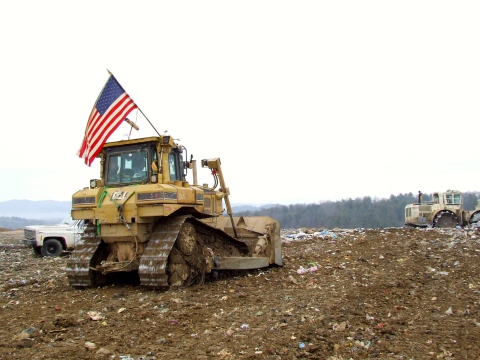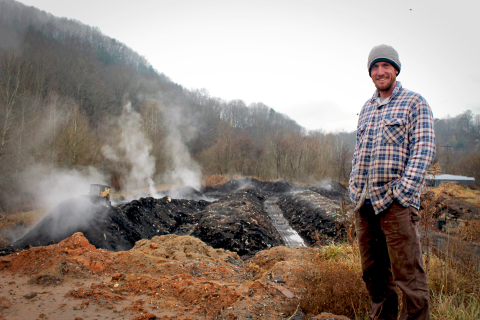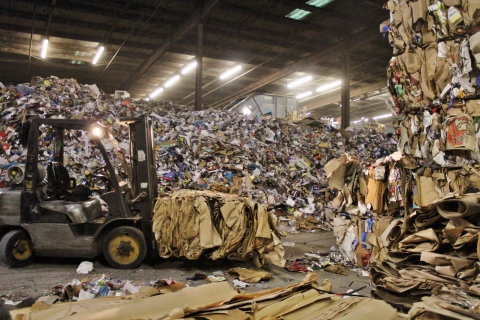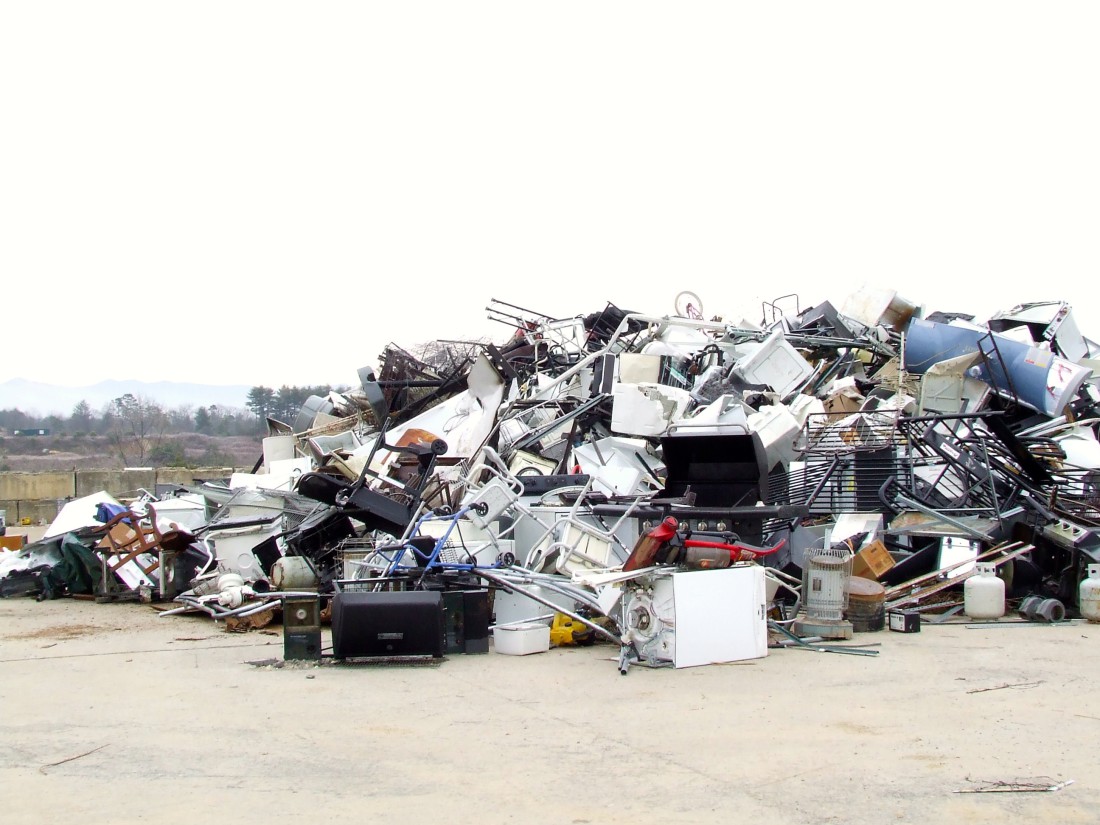Week in, week out, our trash is bagged, tied, dragged to the street, left behind in cavernous dumpsters and promptly forgotten. The cycle is hypnotically simple: take it out, toss it in and worry about it no more. But this isn’t magic — it’s a convenient illusion that prevents us from seeing the true costs of what we so casually throw away. And the cycle of waste often comes with unseen but enormous societal, economic and environmental tolls.
In the summer of 2013, the city of Asheville conducted an extensive study of the trash collected through its residential pickup service. As reported by Richard Grant, solid waste services manager for the city, samples were taken from each city garbage route, generating a thorough report of what exactly is thrown away. The results were shocking.
In an average year, the city produces 22,400 tons of trash. Of that amount, 5,824 tons — 26 percent — is compostable. Another 18 percent of that trash is recyclable — leaving only 56 percent as true waste, fit only for the landfill. That means, according to Grant, if we composted all our organics and placed our recyclables in their proper bin, we could reduce our waste by 44 percent.
But there are bigger issues here than the state of waste at the local level. A broader look shows far-reaching cultural factors that have brought us to the mess we’re in.
Where the rubber hits the road
“We’re often not thinking about all the big picture, larger issues,” says Leah Greden Matthews, an applied environmental economist and professor of economics at UNC Asheville. “We often don’t imagine or fully account for the societal costs when we’re making household decisions on waste or recycling.” That’s where the rubber meets the road, she adds.
One of the greatest costs of a wasteful culture is the land condemned for public use and converted into landfills, Matthews notes. “We need physical space — land allocated to waste, which has an opportunity cost associated with it,” she says. “If we didn’t have so much waste we would not need to reserve that land area for our waste disposal.”
Landfills, especially older ones established without enforced regulations, bring the added and exceptional costs of potential environmental contamination and the probability of impaired water quality, Matthews continues. Then there is the cost embodied in the waste itself, especially if the material is reusable. In the case of metals, paying to extract more virgin material often far outweighs the cost of converting existing material.
Laura Wright, head of the literature department at Western Carolina University, writes about the cultural roots of waste in her blog, The Vegan Body Project. Wright says that it’s easy to ignore the tremendous cost of waste because there is “nothing in our cultural rhetoric about being responsible for the things we consume.”
“Everything that’s out there is about consuming more and consuming all the time, because it’s not in the interest of a capitalist system to curb consumption,” she notes.
Excessive waste and the blasé way in which we disregard what we no longer want or need are encouraged on a cultural scale, Wright adds. “We are a consumer culture,” she notes. “We have so much of everything that’s cheap, easy to get and always at our disposal.”
The end of the line

Perched on high ground in Alexander, the Buncombe County Landfill stretches from Lower Flat Creek to Panther Branch Road. It’s 600 acres all told, 95 of which are actively being filled. The landfill is 18 years old and is divided into 10 cells — with five already full, or “capped.” The site takes in roughly 500 tons of trash per day.
On a bitter-cold day in January, Kristy Smith, bioreactor manager of the site, stands near the leachate lagoon that holds rainwater drained through the landfill’s capped cells. Both the cells and lagoons are double-lined with plastic to prevent groundwater contamination, and leachate is regularly tested before being recirculated through the cells or sent to the wastewater treatment plant.
As the garbage in the capped cells decomposes, methane gas is produced and harvested for the landfill’s Gas to Energy program. “The methane is captured and directed into a generator where it’s combusted,” Smith says. “The energy produced is put on the electrical grid and sold to Progress Energy. We produce enough to power 1,100 homes in the community, and that will grow as the landfill grows.”
It’s a 360-degree view of the Blue Ridge Mountains from cell six. From here, the five capped cells look like grassy knolls with gas extraction pipes, like odd little periscopes, protruding from the earth. The ground itself is made of compacted trash, now 40 feet tall. Tractors compress the garbage, maximizing the space to its full potential. How much time does the landfill have left? That depends on “population growth and recycling habits,” says Smith, but she’s hoping for another 20 to 25 years.
So how did the Alexander site become a landfill? Not quietly. In the early ‘90s, as the old landfill on Riverside Drive in Woodfin grew to capacity, Buncombe County citizens came together in what Claudine Cremer, owner of Meadow Cove Farm, describes as a “4 1/2-year battle” over the proposed Alexander location. The issues at hand included desecration of historic farmland, potential groundwater contamination and location inequity.
“We in North Buncombe felt that we were bearing an unfair load of waste management,” Cremer says. “We had already hosted the landfill, we had the [Metropolitan Sewerage District of Buncombe County] plant, and now, just a few miles up the river, was going to be the new landfill. It was almost as if that corridor had been picked as a sacrifice zone.”
The citizens ultimately lost their battle, but Cremer says there was a greater issue at hand — the perception that another landfill could always be added. “We were going from one landfill to another landfill without re-examining what we were doing,” she asserts. “The state had determined the proper hierarchy of waste management, and that was to reduce, reuse, recycle, compost and then landfilling, as a last choice. Our feeling was that we needed to start at the top of that chain and work our way down, only to landfill what could not have been taken care of by those other means.”
The Alexander location, tucked away in the far northern corner of the county, is also problematic in and of itself, says Eric Bradford, clean communities coordinator at Asheville GreenWorks. “We’re almost inconvenienced by where our landfill is located, because we picked a place that’s far away from everyone else,” Bradford says. “Think about if you live in Black Mountain — you’re on the other side of the county. You can pay for someone to pick it up or take it yourself — those are your two options.”
The city of Asheville provides residential trash and recycling pickup to homes with up to four units for a charge that automatically comes out of the resident’s water bill. Buncombe County offers its residents access to trash and recycling pickup for a small fee — usually around $14 a month, with collection companies like WastePro, Republic or Waste Management. According to Bradford, however, only 50 percent of the county signs up for that option. A small contingent still burns trash or dumps it illegally on public or private land.
To combat the matter of illegal dumping, GreenWorks plans to install cameras “in areas where we know trash is accumulating,” Bradford says.
The food that we throw away

In the 2014 fiscal year, the landfill took in 80 tons of raw and unpackaged food waste from commercial sources. That may not seem like much when compared to other sources — construction and demolition waste, for example, accounted for 20,770 tons. But keep in mind, there is no procedure for tracking how much wasted food contributes to the 113,000 tons of household trash the city alone collected that year, a fact confirmed by Smith.
In America, 40 to 50 percent of all food produced is wasted, as reported by The Post Harvest Project. One grocery store in one week’s time will throw out up to a ton of food, as confirmed by Recycling Works Massachusetts. This doesn’t factor in the energy it takes to grow food, to package it, to ship it and to prepare it — energy that goes to waste along with the tossed-out food.
As with all waste, cultural-level factors are contributing to the amount of food we throw away, says Amy Lanou, chair and associate professor of health and wellness at UNCA. “Our government plus the corporate food system has pushed it to that place in order to get us to buy more than we need,” Lanou says. “They don’t care if we eat it or not, they just want us to buy it.”
When we separate food from its source, it’s easy to take it for granted, Lanou adds. “[The food] we buy now is not what our grandparents bought. Even if they didn’t grow it, they still bought from farmers who were working near them.”
Wright adds that animals in particular have become “this absent thing” and subject to the same cycle of thoughtless waste. “We’re so detached from the process that turns them from living creatures to meat in front of us that they become consumable objects, wasted in the same way that everything else is,” she says.
But that uneaten food doesn’t have to go to waste — in fact, some are finding ways to profit from the organic matter we throw away.
On a misty afternoon, Danny Keaton, owner of Danny’s Dumpster, looks out onto three long windrows made of rich dark soil, watching as steam rises from the earthen heaps. On 6 acres that he leases from the city off Azalea Road, Keaton makes a living turning food waste into compost, which is then sold back to the community.
In one week, he receives 40 tons of food waste hauled in from 120 different places, including Mission and Pardee hospitals, schools, restaurants and the grocery stores Whole Foods/ Greenlife and Earth Fare. Keaton hopes to expand the operation by buying land, ideally 20 to 30 acres. But though his business is linked to food waste, Keaton says he hopes to see more Buncombe County residents learning to compost and reducing the amount of food they’re tossing out.
“Should we really be hauling 40 tons of food waste from only 120 locations?” Keaton reflects. “That sounds like a lot, but what comes here is a drop in the bucket — less than 5 percent of the food waste in this area, I bet.”
Curbie for recycling

Barry and Nancy Lawson are early risers, up and at work with the morning sun. They own Curbside Management, commonly known as Curbie, Buncombe County’s only recycling facility. Curbie’s home is a warehouse in Woodfin that’s been turned into a streamlined recycling and sorting machine. Here recyclables from the city of Asheville and surrounding areas as far as Yancey, Transylvania and Graham counties are processed.
“WastePro, Waste Management, GDS, Republic all bring their recyclables here,” says Nancy, leading a tour of the facility. The immense depository is filled to the brim with overflowing mountains of cardboard, office paper, aluminum cans, glass and plastic bags. All this, Nancy points out, is only three days’ worth of material. In the course of a month, Barry estimates that they take in “over a couple thousand tons.”
Once the material is hauled in, the science of sorting begins. Plastic is separated from cardboard, glass is broken by metal discs, a magnet is used to collect the cans and a low-voltage eddy current pings and propels aluminum cans into place. All of the plastic sorting is done by hand.
The industry as a whole, Barry says, has changed rapidly in the past few years. It used to be that all material, once sorted and bundled, was driven to regional facilities for processing. Now, however, that material travels much farther than ever before: It’s driven to Charleston and then shipped across the world. “We send material to India, Indonesia, South America, to Korea and to China daily,” Barry says. “If you were to ask me three years ago, I would have said that 99 percent of our material was [traveling] within a six-hour radius.”
Recycling, though, is a very high-energy production, and whether it’s economical depends on the material itself. Back at UNCA, Matthews notes that while it may be attractive to assume that recycling is always cheaper than using virgin material, that idea is “a bit simplistic.” Unfortunately, “it’s not economically always better to recycle,” she says.
But recycling does prevent material from being entombed in the land. As Nancy points to the forklifts pushing condensed stacks of paper and crushed plastics, she notes that the facility’s No. 1 goal is “to keep whatever we can from going to the landfill.”
“We’re constantly looking for new markets and new places to send our stuff so it can be made into something else,” she adds.
Back to the source
All this stuff — the packaging that comes with our food, the plastics that wrap our every purchase — are products of our consumer culture. But what can be done?
“Let’s face it,” Barry says. “You and I both buy stuff every day, and it comes with large footprints. If we can reduce the packaging, or at least reduce the material that can’t be recovered, then that’s making a difference.”
But of course, change never comes easily. Keaton observes, “If everyone grew their own food and they realized how long it takes to grow their salad, then it would definitely open people’s eyes. But, as our population increases, it feels almost like a tidal wave. It seems overwhelming; it seems too big to fix.”
Then again, “It’s got to start somewhere,” he adds.
Standing atop trash piled 40 feet deep, Smith notes it ultimately comes back to personal responsibility — our habits and our choices to compost, to recycle, to consider the consequences of what we buy and what we throw away, even when it’s inconvenient. “That’s pretty much where it has to start,” she says. “At the source.”



Before you comment
The comments section is here to provide a platform for civil dialogue on the issues we face together as a local community. Xpress is committed to offering this platform for all voices, but when the tone of the discussion gets nasty or strays off topic, we believe many people choose not to participate. Xpress editors are determined to moderate comments to ensure a constructive interchange is maintained. All comments judged not to be in keeping with the spirit of civil discourse will be removed and repeat violators will be banned. See here for our terms of service. Thank you for being part of this effort to promote respectful discussion.